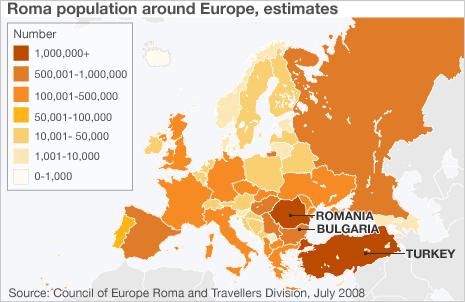EU nations and Roma repatriation
- Published
After a summer of political clashes over how to repatriate Roma (Gypsy) migrants, the BBC News website looks at how some key EU nations are handling the issue.

France
There are at least 400,000 Roma in France, most of whom are part of long-established communities. But in recent years, thousands have been arriving from Bulgaria and Romania, many of whom live in unauthorised camps.
In July, President Nicolas Sarkozy launched a crackdown on these illegal settlements after a gang of Roma men rioted in St Aignan, in the Loire Valley, following the shooting of a local Roma man.
Mr Sarkozy pledged to dismantle some 300 of these camps, which he said were "sources of illegal trafficking, of profoundly shocking living standards, of exploitation of children for begging, of prostitution and crime".
More than 200 settlements have since been dismantled and 1,000 of their inhabitants deported to Romania and Bulgaria. In some cases, French authorities have offered financial incentives to migrants who return home - such as grants for agricultural business schemes.
But France has been accused of violating EU rules on human rights, by allegedly targeting an ethnic group.
A leaked memo from the interior ministry showed that French authorities had been instructed to make Roma camps "a priority", rather than deal with migrants on a case-by-case basis.
EU Justice Commissioner Viviane Reding called the deportations a "disgrace".
"This is a situation I had thought Europe would not have to witness again after the Second World War," she said.
The European Parliament passed a motion "expressing its deep concern" at the measures taken by the French authorities, urging them to immediately suspend all expulsions of Roma.
But French Interior Minister Brice Hortefeux said the new measures were "not meant to stigmatise any community, regardless of who they are, but to punish illegal behaviour".
Italy
There are about 140,000 Roma in Italy, half of whom (70,000) are Italian citizens. Many were migrant workers who came from Yugoslavia in the 1980s when the Cold War thawed. Many more arrived in the 1990s following the conflicts in Bosnia and Kosovo.
But in the past decade, tens of thousands of Romanian Roma have arrived, many of whom have not been granted residency. These communities became a focus of suspicion and hostility.
In April 2008, Prime Minister Silvio Berlusconi memorably described illegal immigrants as "an army of evil". A month later, his government launched a high profile campaign using "extreme measures" to target Roma migrants living in "nomad camps".
The camps were dismantled and thousands of Roma are believed to have left or been expelled from Italy.
The government has also passed laws to ease the expulsion of foreign nationals, including EU nationals, which "appear to be particularly aimed at Roma from Romania", according to a report by the Council of Europe Commissioner for Human Rights.
Spain
Spain has a large and well-established population of Roma, known as Gitanos, many of whom hail from Andalucia. There are more than 700,000 Roma living in Spain.
Like France, Spain has also received a recent influx of Romanian Roma. But unlike France, there has been no high profile crackdown against Roma.
Spain's Prime Minister Jose Luis Rodriguez Zapatero is seen as being more tolerant to Roma migrants than his counterparts in France and Italy.
Germany
Like Italy, Germany has a strong contingent of Roma who arrived from the former Yugoslavia. Many of Germany's estimated 105,000 Roma are now long-term residents with protected status.
Others have "duldung" (tolerated) status, meaning they do not have permanent residency, but instead have to queue frequently to have their status renewed.
Their access to employment, healthcare and freedom of movement may be restricted. Those who have been "tolerated" for six years or more are eligible to apply for a residency permit.
In recent years thousands of Roma have been forcibly expelled or expelled under pressure from Germany.
But many true Roma have remained as they are not welcome in their home nations and as such Germany has been unable to secure conditions for their safe return.
UK
There are about 250,000 Roma in the UK, most of whom are from native Traveller and Gypsy communities. But since the 1990s, thousands more have arrived from Slovakia, Poland, Romania and the Baltic states.
Initially, most sought refugee status, but now many are exercising free movement rights, following EU expansion.
In June 2009, about 100 Roma were forced to leave Belfast after a spate of attacks on their homes. The migrants later returned to the community.
In recent years the UK government has moved to tighten its borders, expelling illegal immigrants and failed asylum seekers, who have included Roma.